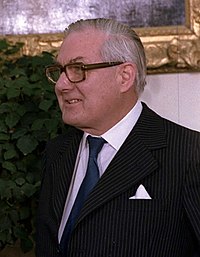
In the United Kingdom, the green pound was the common name for an exchange rate that was used to calculate the value of financial support within the European Union's Common Agricultural Policy until 1999.
Background
Prior to the institution of a common currency, the then European Economic Community decided in 1962 to denominate its transactions in its own internal unit of account – initially the gold parity unit of account, fixed to the value of gold, and equivalent to the US dollar.
Following the devaluation of the French franc and the revaluation of the Deutsche Mark in 1969, the governments involved considered that agricultural support should not be subject to the fluctuations of floating exchange rates, arguing that lower prices would be unacceptable for farmers, while higher prices would be inflationary. Instead, they continued to use a form of fixed exchange rates for agricultural support, resulting in the so-called 'agricultural conversion rates' or 'green exchange rates', including the green pound after the United Kingdom's accession to the EEC on 1 January 1973.
Revaluations, devaluations and politics
Although the value of the green pound was changed from time to time, initially such changes could only take place by agreement between the governments, making the value of the green pound a significant political issue. At certain points during the 1970s the green pound was overvalued by up to 30% compared to the pound sterling, keeping food prices and British farmers' incomes artificially low.
On 23 January 1978, following a campaign by the National Farmers Union (NFU) that was opposed by the trades unions and other interests, the Callaghan Government was defeated in a vote in the House of Commons when a Conservative amendment to devalue the green pound by 7.5%, rather than the 5% devaluation proposed by the Government, was passed with the support of other opposition parties and some Labour backbenchers. Cabinet papers later revealed that the Government considered that a 5% devaluation was the minimum necessary to stem the decline in the UK's beef and pig sector in the face of competition from Danish bacon and Irish pork, potentially saving several thousand jobs, but that this was forecast to increase the cost of food by 1%. In practice, the Government applied the devaluation selectively and in stages, with an initial 5% devaluation applying to livestock only.
The value of the green pound went on to become an issue in the 1979 General election as well as featuring in manifestos at the following elections.
In February 1989 Sir Simon Gourlay, President of the NFU, attacked the Thatcher government for maintaining the level of the green pound while sterling fell, a call he repeated a year later.
From 2 August 1993, all green rates were subject to automatic adjustments linked to market exchange rates. Between 1992 and 1995 the green pound was devalued by over 20%, raising Common Agricultural Policy prices by over 27%.
Between November 1996 and May 1998 the value of the green pound increased by nearly 20% as it was revalued five times as sterling strengthened, with the Bank of England observing that this had caused 'severe problems' in the agricultural sector. The series of rises included an unprecedented increase of 5.4% on 21 January 1997, resulting in a reduction of 5.2% in support prices.
The green pound ended with the introduction of the euro in 1999, since when all payments have been based on the euro exchange rate.
See also
- Agriculture in the United Kingdom
- Bretton Woods system
- List of Government defeats in the House of Commons
References
- ^ Europedia, accessed 2012-01-09
- ^ B. Steiner (1993)."Of Snakes in the Tunnell, Green ECU's and the EMU". University of Reading. Accessed 9 January 2012.
- ^ Brian E. Hill. The common agricultural policy: past, present, and future. ISBN 978-0-416-32190-6
- "Agriculture (Green Pound) (Hansard, 23 January 1978)". UK Parliament. 1978-01-23. Retrieved 2012-01-09.
- The Politics of the Green Pound, 1974-79, Wyn Grant, JCMS: Journal of Common Market Studies Vol 19 No 4, Blackwell Publishing Ltd, doi 10.1111/j.1468-5965.1981.tb00239.x, published 1981-06-04
- Speech to National Farmers Union Margaret Thatcher Foundation, published 1978-01-24, accessed 2012-01-11
- ^ The Campaign Guide Supplement 1978, Conservative and Unionist Central Office, published March 1978, accessed 2012-01-11
- Cabinet Memorandum CAB 129/199/3: The Green Pound, John Silkin, published 1978-01-16, accessed 2012-01-09
- 1979 Conservative Party Manifesto accessed 2012-01-09
- UK Party Election Broadcasts 1979: Labour Party (Archive), accessed 2012-01-09
- Conservative General Election Manifesto 1983 Margaret Thatcher Foundation, accessed 2012-01-09
- 1987 Liberal/SDP/Libdem Party Manifesto LibdemManifesto.com, accessed 2012-01-09
- Sir Simon Gourlay, Farmers Weekly, published 1989-02-08, accessed 2012-01-09
- Early day motion 469 - United Kingdom Farming and the Green Pound UK Parliament, published 1990-02-07, accessed 2012-01-09
- UK minister wants end to green pound - but not yet Agra Europe, published 1990-02-16, accessed 2012-01-09
- GREEN RATES: AUTOMATIC ADJUSTMENT EUROPA, published 1993-08-11, accessed 2012-01-09
- The Bank’s new UK commodity price index Archived 2008-12-06 at the Wayback Machine, Bank of England, Andrew Logan and Lucy O’Carroll, published August 1995, accessed 2012-01-11
- Research Paper 99/77: British Farming and Reform of the Common Agriculture Policy Archived 2016-03-03 at the Wayback Machine, House of Commons, published 1999-08-13, accessed 2012-01-09
- ^ Minutes of the Monetary Policy Committee meeting held on 3 and 4 June 1998 Archived 3 December 2011 at the Wayback Machine, Bank of England, published 1998-07-15, accessed 2012-01-11
- Sterling Strengthens - Farmers lose out, say farmers, National Farmers' Union of Scotland, accessed 2012-01-11
- Council Regulation (EC) No 2799/98 of 15 December 1998 establishing agrimonetary arrangements for the euro EUR-Lex, accessed 2012-01-09
- Memorandum submitted by the Department of Agriculture for Northern Ireland Archived 2016-03-04 at the Wayback Machine House of Commons, published 2000-03-14, accessed 2012-01-11